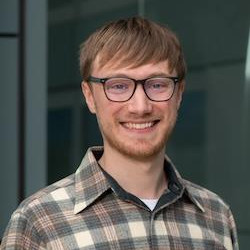
Andrew Naylor
Postdoc - Employee
National Energy Research Scientific Computing Center (NERSC)
Science Engagement & Workflows Dept.
Data & AI Services Group
Andrew Naylor is a NERSC NESAP postdoctoral fellow specializing in artificial intelligence (AI) and high performance computing (HPC). His work involves accelerating scientific AI workflows, developing and optimizing large language model (LLM) applications, and collaborating with researchers and industry partners to provide technical support and training. Naylor collaborated with the ATLAS and CMS experiments at the Large Hadron Collider (LHC), where he implemented and optimized machine learning inference-as-a-service via the Nvidia Triton Inference Server for physics analysis. His current work with the CMS experiment involves exploring efficient GPU utilization with the SONIC framework on the NERSC Perlmutter supercomputer, enhancing computational efficiency and performance. Naylor earned his Ph.D. in experimental particle physics from the University of Sheffield in 2022. His doctoral research involved simulating and analyzing complex radiation background sources in the LUX and LZ dark matter experiments using advanced data analysis techniques. Visit Andrew’s LinkedIn page for more.
Recent Publications
Nuclear Recoil Calibration at Sub-keV Energies in LUX and Its Impact on Dark Matter Search Sensitivity
Authors: Akerib, DS; Alsum, S; Araújo, HM; Bai, X; Balajthy, J; Bang, J
February 2025, Physical Review Letters
Two-neutrino double electron capture of 124Xe in the first LUX-ZEPLIN exposure
Authors: Aalbers, J; Akerib, DS; Al Musalhi, AK; Alder, F; Amarasinghe, CS; Ames, A
January 2025, Journal of Physics G: Nuclear and Particle Physics
Constraints on Covariant Dark-Matter–Nucleon Effective Field Theory Interactions from the First Science Run of the LUX-ZEPLIN Experiment
Authors: Aalbers, J; Akerib, DS; Al Musalhi, AK; Alder, F; Amarasinghe, CS; Ames, A
November 2024, Physical Review Letters
Neutrinoless double beta decay sensitivity of the XLZD rare event observatory
Authors: Aalbers, J; Abe, K; Adrover, M; Maouloud, SA; Akerib, DS; Al Musalhi, AK
April 2025, Journal of Physics G: Nuclear and Particle Physics
More By Andrew Naylor